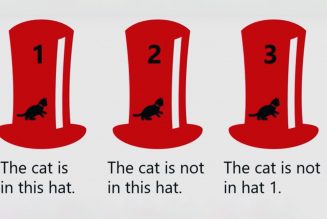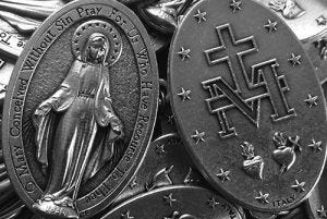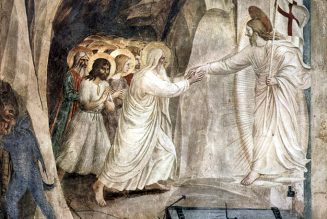
“What is to prevent me from being baptized?”
April 27, 2023 by Amy Welborn
From the secretary, St. Bureaucratis Parish, to Inquirer, c/o Ethiopian Embassy:
In response to your recent query:
- Please provide three copies of your birth certificate, marriage certificates and high school transcripts.
- The schedule for the next year of our “Come and See our Joy-filled Family of Faith, Community and Ministry for Everyone” adult formation is attached.
- Your assigned sponsor will contact with you within three months.
- Please go to the website to sign up for an appointment date with our Life-long Into Adulthood Faith Formation and Inclusive Ministry Director.
- Please send a copy of your Covid vaccine record
Today’s first reading was proclaimed in 2020 during Easter season on April 30 while most of the Catholic world was still in hard lockdown, and I riffed (at length, of course) about it here.
My point: Post-Vatican II liturgical life prioritized the role and presence of community in celebration. This has, it seems, two unintended consequences: First, to minimize the object nature of the ritual action, and secondly, to ill-equip Catholics to engage in sacramental life when that community life is disrupted.
Traditional Catholic life, as it had evolved over the centuries, balanced this, by presenting a solidly objective sense of the workings of grace through word, matter and action and then allowing culturally-varied traditions and practices to grow up around these rituals.
But you always knew, even if your community had to be on the move or went through other changes, that the sacramental actions, even if minimally performed, were valid and powerful and connected you to God and the wider global community of the Body of Christ.
Each of us is brought into being by God, who invites and calls us to be in communion – with other human beings, with the cosmos he has made us part of, and with him. Our religious rituals and devotions are woven into that reality and express it. It’s particularly evocative and meaningful when they express God’s actions and our connection to each other in our community and culture.
In short: the whole crew gathering for the baptism and celebrating into the night afterwards. Maybe with a procession between the church and the house just because.
But there’s a risk, there, isn’t it? It’s a risk that the party can take over, that First Communicant is most concerned with how many envelopes are coming his way, that the wedding becomes a fashion show, a battle ground, or maybe both. That all of these moments become social markers, the actual meaning pushed aside. This happened before the modern era, it happens now.
The anti-minimalist argument has always centered on the risk of magical thinking. I’d argue that the modern sociological emphasis also leads to magical thinking. The magic just has a different locus: the “community.”
And so the opportunity comes to revisit and rethink. It’s too bad we have to live with restrictions. But can the restrictions be a chance to refocus?
Can the disappointment at only being able to do the minimum, in the end, work to reveal the power and grace given to us within that minimum, and the amazing love of God who sends people to meet us on the road, and with a splash of water, gives us …everything?
I will add that there have always been actually pastoral pastors and ministers who have listened to seekers’ and inquirers’ stories in the mode of the apostle Philip. They have been open to the presence of the seeker on the road. They’ve taken the time to instruct and answer their questions. And when the Spirit moves, they don’t hold up more and more hoops. They stop the chariot right there, and go find some water.









